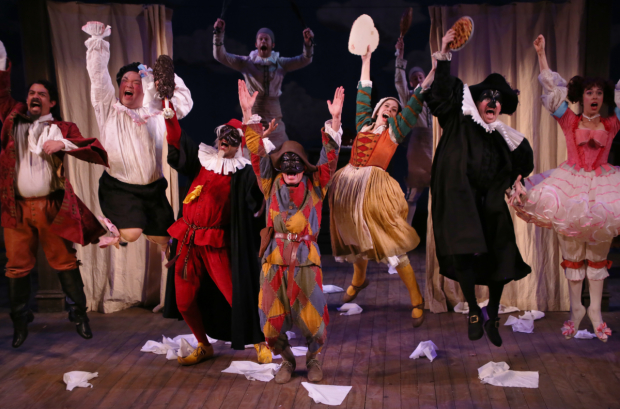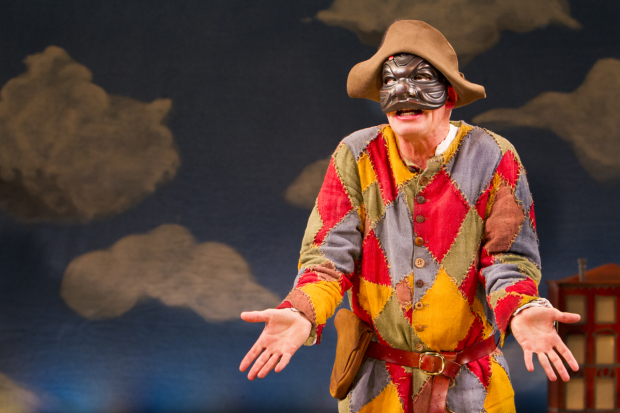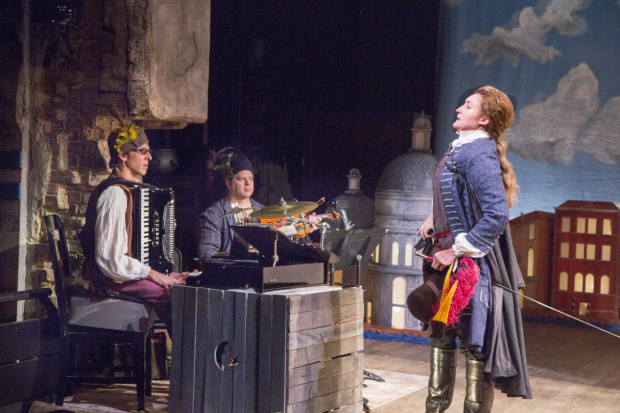
(© Gerry Goodstein)
If you're totally done with 2016, you might consider finding respite in 1746: That's the year that Italian playwright Carlo Goldoni wrote The Servant of Two Masters, a perennially popular comedy that has been the subject of multiple adaptations over the last 270 years (most recently, One Man, Two Guvnors, the Broadway comedy that won James Corden a Tony). Constance Congdon, Steven Epp, and Christopher Bayes (who also directs) are presenting their English-language adaptation at Brooklyn's Theatre for a New Audience with the help of an insanely eager cast.
Goldoni is largely credited with bridging the gap between commedia dell'arte (a popular theatrical form that relied on stock characters and improvisation) and the scripted comedies of Molière. The Servant of Two Masters retains those commedia roles, but ties them to a rigid plot. Congdon and Bayes attempt to capture this tension by presenting Goldoni's story while simultaneously leaving ample room for the actors to play. The result is something of a wash: The play is neither brilliant in its contrivance, nor thrilling in its spontaneity.
At the beginning of the show, Florindo (Orlando Pabotoy) has fled to Venice after killing Federigo, the brother of his lover, Beatrice (Liz Wisan). Meanwhile, Beatrice arrives in Venice disguised as her brother in an attempt to collect a dowry from Pantalone (Allen Gilmore), the father of Federigo's former betrothed, Clarice (Adina Verson). She dreams of taking the money and running away with Florindo. Through a combination of impatience and happenstance, the servant Truffaldino (Steven Epp) becomes employed by both Florindo and Federigo (who is really Beatrice). He tries desperately to keep the demanding bosses from discovering each other, thereby improbably extending the running time.
The entire cast gives it their all in performing this thin yet convoluted plot, and that is part of the problem. The more you encourage them, the harder they push the comedy in ways that just aren't funny, with over-the-top noises and exaggerated facial expressions aimed directly at the audience. Pratfalls and poop jokes substitute for wit.
Certainly, many viewers will delight in such gleefully lowbrow humor. Epp (who is credited as a coadapter) sells it better than anyone in the cast, so that even if this kind of comedy isn't your cup of tea, you can't help but laugh. His comic juggling of food at two competing feasts at the end of the first act is not only hilarious but physically very impressive. Alas, even he cannot compensate for an overly long script weighed down by zany line readings and mildly funny sight gags that director Bayes unwisely opted not to ax. He speaks for all of us when he turns to the audience around the two-hour-15-minute mark and says, "This play is never going to end."

(© Henry Grossman)
In keeping with the commedia tradition (and perhaps in an attempt to give the show a modern edge), Bayes and the actors pepper the script with contemporary references and allusions, many of them improvised: Gilmore's Pantalone inexplicably says sassy gay things like "girl" and "no wire hangers." As the grotesque ingenue Clarice, Adina Verson screams like Robert Plant in "Immigrant Song." Although timed to perfection, an endless parade of rimshot jokes about the election quickly becomes stale. Rather than distracting us from our woes with laughter, they have to opposite effect, dragging us out of this mirthful (if slightly annoying) fantasy.
At least we always have something pretty to listen to thanks to tireless composer-musicians Christopher Curtis and Aaron Halva, who sit on the side of the stage and accompany the entire show. Halva, who is also the music director, impressively plays the accordion, drums, and the keyboard glockenspiel (often at the same time). The cast sings in lovely harmony on their musical numbers, temporarily transporting us away from the tedium of their comedy.

(© Henry Grossman)
The design is hit-and-miss: Katherine Akiko Day's set features a proscenium within the proscenium, pointing out the artifice of this theatrical venture in a way that already seems obvious. Valérie Thérèse Bart's costumes perfectly capture the pedigree of the characters (Truffaldino wears a harlequin pattern), while lighting designer Chuan-Chi Chan creates some magical moments with fairy lights and flickering embers.
One of those lighting cues happens in the opening moments, after two actors speaking pidgin Italian "break into" the theater and shake the dust off a bunch of commedia costumes, as if to telegraph their intention to do the same to the genre. By the end of this moldy adaptation, you wish they had taken them to the laundromat. Undoubtedly, the spin cycle would have made for more compelling entertainment.









